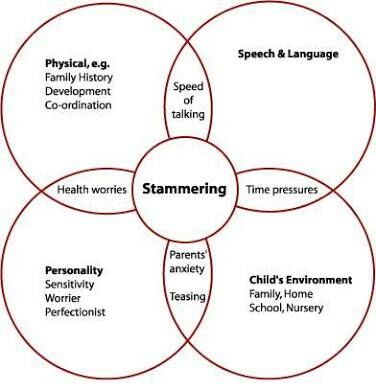What is Stammering? Stammering is a speech disorder. In stammering, normal fluency  of speech is disrupted. The disruption of speech may arise in various forms. Mainly disruption of speech arises in the form of repetition of certain words, prolongation/extension of certain words/syllables, or silent pauses in between speech. Stammering is very common among children and arises when the speech ability is not properly developed. In most children, the issue of stammering goes away on its own though sometimes stammering persists in adulthood. Stammering may severely affect the emotional state of a person. It may lead to associated stress, anxiety, feeling ashamed in social communication.
of speech is disrupted. The disruption of speech may arise in various forms. Mainly disruption of speech arises in the form of repetition of certain words, prolongation/extension of certain words/syllables, or silent pauses in between speech. Stammering is very common among children and arises when the speech ability is not properly developed. In most children, the issue of stammering goes away on its own though sometimes stammering persists in adulthood. Stammering may severely affect the emotional state of a person. It may lead to associated stress, anxiety, feeling ashamed in social communication.
Causes
Researchers are still studying the underlying causes of persistent stuttering. A combination of factors may be involved. Possible causes of persistent stuttering include:
Abnormalities in speech motor control
Some evidence indicates that abnormalities in speech motor control, such as timing, sensory and motor coordination, are implicated.
Genetics
Stuttering tends to run in families. It appears that stuttering can result from inherited (genetic) abnormalities in the language centers of the brain.
Medical conditions
Stuttering can sometimes result from a stroke, trauma or other brain injury.
Mental health problems
In rare, isolated cases, emotional trauma can lead to stuttering
Symptoms
-Stuttering signs and symptoms may include:
-Difficulty starting a word, sentence or phrase
-Prolonging a word or sounds within a word
-Repetition of a sound, syllable or word
-Brief silence for certain syllables or pauses within a word (broken word)
-Addition of extra words such as “um” if difficulty moving to the next word is anticipated
-Excess tension, tightness or movement of the face or upper body to produce a word
-Anxiety about talking
-Limited ability to effectively communicate
The speech difficulties of stuttering may be accompanied by
# rapid eye blinks
# Tremors of the lips or jaw
# Facial ticks
# Head jerks
# Clenching fists
Risk factors
Factors that increase the risk of stuttering include:
#Having relatives who stutter. Stuttering tends to run in families.
#Delayed childhood development. Children who have developmental delays or other speech problems may be more likely to stutter.
#Being male. Males are much more likely to stutter than females are.
#Stress. Stress in the family, high parental expectations or other types of pressure can worsen existing stuttering.
Complications Stuttering can lead to:
· Low self-esteem
· Problems communicating with others
· Not speaking or avoiding situations that require speaking
· Loss of social, school or work participation and success
· Being bullied or teased
· Being anxious in social situations or being diagnosed with social anxiety disorder
Homeopathic treatment for stuttering
Homeopathic remedies are very effective in stuttering. They are natural, gentle, harmless, and easy to take.
Homeopathy is a holistic medicine and treats the whole person. Stuttering children are generally more sensitive or anxious and stuttering often starts after a stressful situation or is due to a combination of physical and emotional issues.
Remedies like….. causticum, Lachesis,stramonium ,merc , Lycopodium etc are suggestive.
Homeopathy acts not only on the vocal muscles and the speech but also on the root cause of stuttering.
Article by – Dr. Kajal Verma,-homoeophysician



